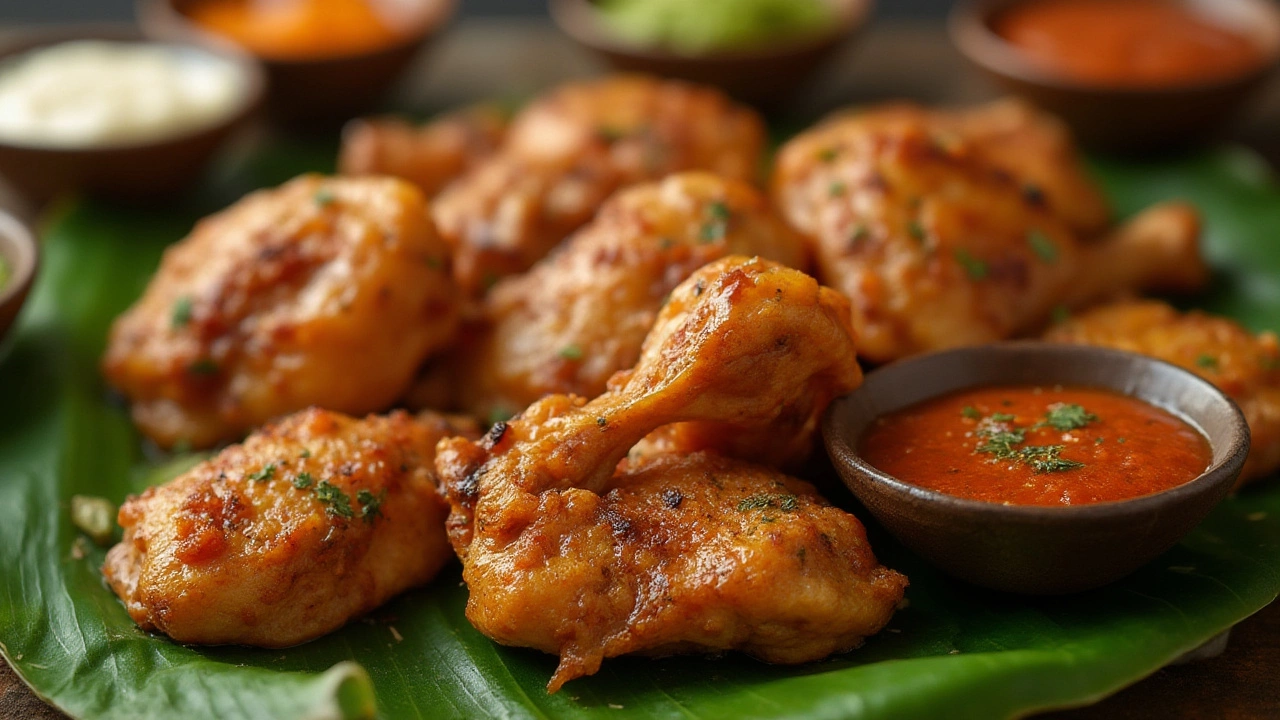Ever bite into a home-cooked chicken breast only for it to fight back? That dreaded rubbery, tough texture ruins dinner faster than Neerav can clear his plate when I attempt anything new. The good news? You don't have to settle for chicken that needs more chewing than a toffee. There's real kitchen magic behind soaking chicken—smartly chosen soaks can turn even bargain supermarket fillets into something so juicy and tender it could make you swear you're eating chef-made food. Let’s unravel which liquids actually help and which are, honestly, just a waste of time and groceries.
The Science Behind Tender Chicken: Why Soaking Works
The process of making chicken tender isn't about drowning it. It’s about what goes into the soak and how it interacts with the muscle fibers. Chicken, like all meat, is made up of muscle proteins tightly bound together. When you just cook chicken straight from the fridge, those proteins seize up and squeeze out moisture—cue the dry, stringy bites. But when you soak or marinate chicken, a few different things can happen, depending on your ingredients.
Acids like lemon juice or vinegar help by unwinding muscle fibers, making it easier for moisture to slip in and stay while cooking. Yogurt and buttermilk have gentle acids plus enzymes and proteins that coat and cushion the chicken for a more gradual, less destructive tenderizing action. Salt, often added via brines, actually pulls water into the chicken and breaks some protein bonds as well, acting as both flavor booster and insurance policy against dryness.
But get this—using too much acid or marinating for too long is a rookie mistake. If you leave chicken swimming in vinegar overnight, those very fibers you're trying to relax can start to break down too far, and you’ll end up with a weird, mushy texture. Trust me, I’ve been there, thinking more time meant more tenderness. Nope. Fifteen to sixty minutes for acids, two to eight hours for dairy—those timeframes really matter.
Now, some people swear by pineapple or kiwi in their marinades. These both have natural enzymes (bromelain in pineapple, actinidin in kiwi) that can break down tough proteins. But like acid, these work fast—leave chicken marinating with them for too long, and you’ll move past tender straight into soggy. Science-wise, fruit enzymes work best in just 15-20 minutes.
So, soaking chicken works because it lets the marinade’s acid, salt, or enzymes soften up the muscle fibers, make space for juicy moisture, and stop the meat from turning tough under heat. It's not magic—it's pure, repeatable kitchen science. And when you know which molecules do what, you end up serving chicken that has people surprised you didn’t order takeout.
Best Liquids for Soaking: What Actually Makes Chicken Tender?
Let’s get real—what you soak chicken in completely changes its tenderness and flavor. Some liquids are tried-and-true, while others are more hype than help. Here’s what actually works:
- Buttermilk: Every fried chicken lover’s secret weapon. Buttermilk is slightly acidic, but not so much that it bashes the protein structure. Plus, it has fat and protein that insulate the chicken. Two to eight hours in buttermilk turns even the plainest cuts into juicy, flavor-packed bites. Don’t skip this if you want Southern-style chicken.
- Yogurt: Greek or plain whole-milk yogurt is packed with lactic acid and calcium. It slowly breaks down proteins, so it’s perfect for overnight soaks. That’s why Middle Eastern recipes (think tandoori, shawarma) often use yogurt—tender and flavorful without going mushy.
- Salt Water Brine: This is where science nerds get excited. A basic brine, using about 1/4 cup kosher salt per quart of water, actually changes the protein structure so chicken holds onto extra moisture. Even just 30 minutes in brine changes everything. Restaurants use this trick all the time.
- Citrus Juices and Vinegars: Lemon, lime, or vinegar are quick fixes for toughness, but only need short soaks (30-60 minutes). Too long and you’ll get a weird texture or a harsh bite.
- Fruit Juices (Pineapple, Kiwi): Fifteen to twenty minutes is all you need. Any longer and that powerful enzyme action turns your chicken gooey. Works best for thin strips, like stir-fry chicken.
- Coconut Milk: It’s mildly acidic and brimming with fat. Coconut milk adds a gentle touch and is used in lots of Southeast Asian marinades. Let chicken sit in this for a few hours for flavor-packed, tender results.
Some liquids are best left for something else—plain water or wine, for example, do little to tenderize unless mixed with salt or acid. And don’t bother with oil alone; it helps flavor stick, but it won’t tenderize on its own.
A study from the American Meat Science Association found brined chicken could retain up to 15% more moisture after cooking than non-brined chicken, which is serious protection against dryness. Salt's a small thing, but makes a huge difference!

How to Soak Chicken: Best Practices and Big Mistakes to Avoid
If you want chicken so tender it pulls apart with a fork, there's a method behind the marinade. Just dumping some chicken in a bag with liquid and hoping for the best won't work. Here’s how to nail it every single time:
- Pick the right vessel: Use glass or food-safe plastic bowls or zip bags, not metal, because acid can react with metal and mess up the flavor.
- Pat the chicken dry before soaking: This helps the marinade stick and stops watery flavor dilution.
- Always cover and chill: Marinating at room temp is just playing food roulette with bacteria—always pop it in the fridge.
- Don’t overdo it: Stick to recommended soak times (see handy table below).
- Rinse briefly or pat dry after soaking: Especially important with salty brine or yogurty marinades. This avoids overly salty or sticky skin when cooking.
- Let chicken come close to room temperature (20-30 minutes out of the fridge) before cooking. This ensures even cooking and juiciness.
| Soak Type | Best Time | Result |
|---|---|---|
| Buttermilk | 2-8 hours | Very tender, mild flavor |
| Yogurt | 2-24 hours | Extra juicy, tangy, not stringy |
| Salt Water Brine | 30-120 minutes | Significantly juicier, lightly salted |
| Citrus or Vinegar | 15-60 minutes | Tender, but more tangy and less moisture added |
| Fruit Enzyme Marinade | 10-20 minutes | Super quick tenderizing, risk of mushiness |
Avoid the classic mistakes—don’t marinate with too much salt for too long, as the chicken can turn rubbery. And with really acidic marinades, keep it brief. For naturally tender cuts (like thighs), short soaks work; tougher cuts (like breasts) benefit from the full recommended time.
Winning Flavors: Marinade Recipes and Flavor Boosters
If you want chicken that’s not just tender but makes people ask for seconds, flavor counts as much as texture. Here are three of my go-to marinades that never fail and get rave reviews—even from picky eaters like Neerav:
- Classic Buttermilk Fried Chicken Marinade:
- 2 cups buttermilk
- 1 tablespoon kosher salt
- 1 teaspoon black pepper
- 1 teaspoon paprika
- 1 teaspoon garlic powder
- 1/2 teaspoon cayenne pepper
- Greek Yogurt and Herb Marinade:
- 1 cup Greek yogurt
- 1 tablespoon lemon juice
- 3 garlic cloves, crushed
- 1 tablespoon chopped fresh dill
- 1 tablespoon chopped mint
- 1 teaspoon salt
- 1 teaspoon black pepper
- Quick Pineapple Teriyaki Marinade:
- 1/2 cup pineapple juice
- 1/4 cup soy sauce
- 2 tablespoons brown sugar
- 1 tablespoon grated ginger
- 2 grated garlic cloves
- 1 tablespoon sesame oil
On busy nights, even a quick 30-minute salt water brine can save dinner. No fancy shopping lists, no waiting overnight. Just a little patience and the right soak, and your chicken will always hit the mark for tenderness and juiciness.
And a little secret? The best chicken you’ve ever had probably started with a soak. Restaurant chefs rarely skip this step, and neither should you. Whether you’re aiming for crispy fried, smoky grilled, or simply oven-baked chicken, the soak is the step that sets your cooking apart. People may not know exactly what you did, but they’ll remember how it tasted—and isn’t that what really matters?
